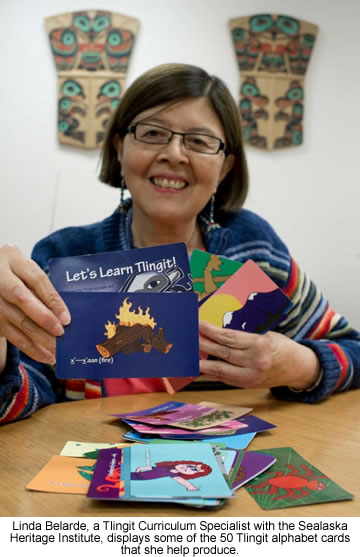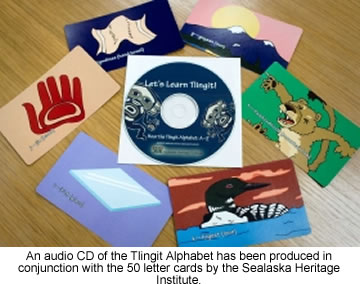 |
Canku Ota
|
 |
|
(Many Paths)
|
||
|
An Online Newsletter
Celebrating Native America
|
||
|
September
1, 2011 - Volume 9 Number 9
|
||
|
|
||
|
Alaska Institute
Striving to Pass on Tlingit, Other Endangered Native Languages
|
||
|
by JONATHAN GRASS -
Juneau Empire
|
||
|
Credits:
photos by Michael Penn - Juneau Empire
|
 JUNEAU,
Alaska — Tlingit speakers and educators are fighting to keep
that language alive. As those at Sealaska Heritage Institute (SHI)
put it, creating new speakers will be key in accomplishing this. JUNEAU,
Alaska — Tlingit speakers and educators are fighting to keep
that language alive. As those at Sealaska Heritage Institute (SHI)
put it, creating new speakers will be key in accomplishing this.
In fact, the Native institute has just introduced a new Tlingit language card program as part of this mission. The program is a set of flash cards and audio CDs to help gain efficiency in the alphabet. They use pictures as well as an online interactive tool to help kids learn the Native language. Tlingit Curriculum Specialist Linda Belarde said the tool is important because new speakers are needed for a language to survive. As for Tlingit, she said there just aren't that many birth speakers left. "One of things I say to young people is that with every obituary, there goes another Tlingit speaker," Belarde said. Belarde said there's been a lot of interest in the cards so far, mostly from language teachers. She said that while the cards are designed for kids, they can be useful for older language learners. "Language carries the point of view of a way of looking at the world so it's just really important that we can keep Tlingit alive and Haida and Tsimshian," Belarde said. SHI President Rosita Worl also believes the language must be kept alive as part of the culture. However, while kids may learn the language, it may never again be used as a first language. "I don't know if we can ever completely restore it but we will always hear the voices of our ancestors on this land," said Worl. "It may never again be our first language but we will always hear it." She said this idea was even a theme at a recent celebration.
Worl said a big push in this idea came around 12 years ago when SHI trustees met Hawaiians and learned about their language restoration programs. She said some of those trustees were even brought to tears at hearing those children speak their native language. She said that was the point when SHI decided to make language revitalization its highest priority, shifting the institute to go from preservation-only to action-oriented. However, Worl said educators, families and others must get involved to keep Tlingit going. SHI can help provide the tools but can't save the language alone. "Our philosophy is that you'll never save the language and culture from 1 Sealaska Plaza. It has to be community-based," she said. She said the new card tool is a "little milestone" toward this, but lots more are needed. Belarde said there are a number of written resources to help keep the language going, including books. She said tools like the cards are helpful for reading these and to speak it as well. She said learners have to know what the characters they're reading sound like. "A problem is we don't hear Tlingit on TV or radio. Hearing it is often the first part of learning," she said. She said the audio part is mostly done in classroom settings today but that wasn't always the case. She said KTOO even used to run "Tlingit hours." The Tlingit alphabet itself is unique with 50 characters to learn. Four of those sounds aren't found in any other language. Most of the English letters do have Tlingit counterparts, but not all. Sounds for letters can differ too. "The good news about the Tlingit alphabet is it's consistent. Once you memorize a sound, every time you see it written it's the same sound," Belarde said.
Sealaska
Heritage Institute |
|
|
||
|
|
||
| Canku Ota is a free Newsletter celebrating Native America, its traditions and accomplishments . We do not provide subscriber or visitor names to anyone. Some articles presented in Canku Ota may contain copyright material. We have received appropriate permissions for republishing any articles. Material appearing here is distributed without profit or monetary gain to those who have expressed an interest. This is in accordance with Title 17 U.S.C. Section 107. | ||
|
Canku Ota is a copyright ©
2000, 2001, 2002, 2003, 2004, 2005, 2006, 2007, 2008, 2009, 2010,
2011 of Vicki Barry and Paul Barry.
|
||
 |
 |
|
|
The "Canku
Ota - A Newsletter Celebrating Native America" web site and
its design is the
|
||
|
Copyright ©
1999, 2000, 2001, 2002, 2003, 2004, 2005,
2006, 2007, 2008, 2009, 2010, 2011
of Paul C. Barry.
|
||
|
All Rights Reserved.
|
||
 Worl
said learning the language is critical and the children should learn
to read it and make the sounds. She said SHI has worked to raise
awareness of this and has language programs in 10 Southeast communities.
Worl
said learning the language is critical and the children should learn
to read it and make the sounds. She said SHI has worked to raise
awareness of this and has language programs in 10 Southeast communities.